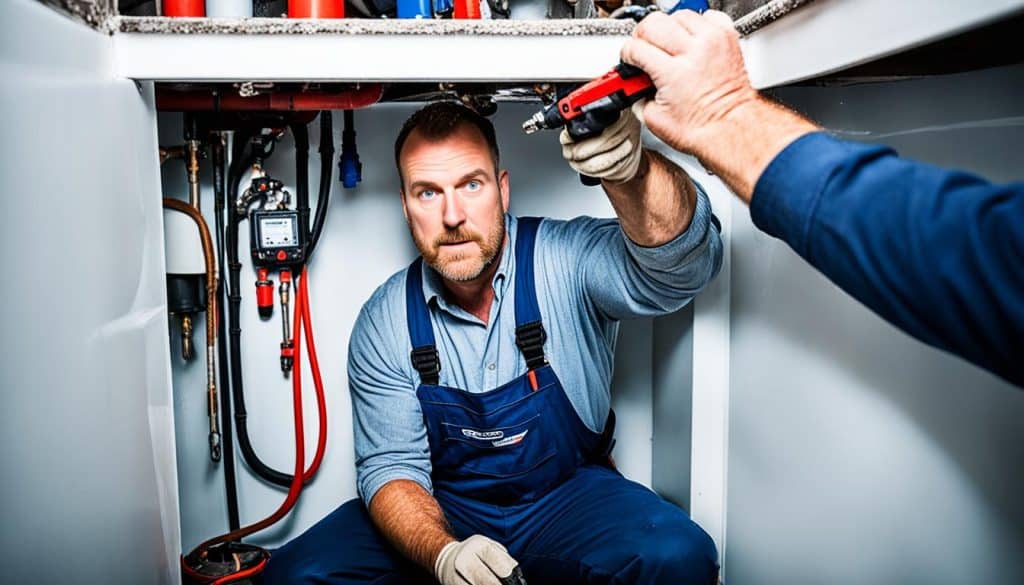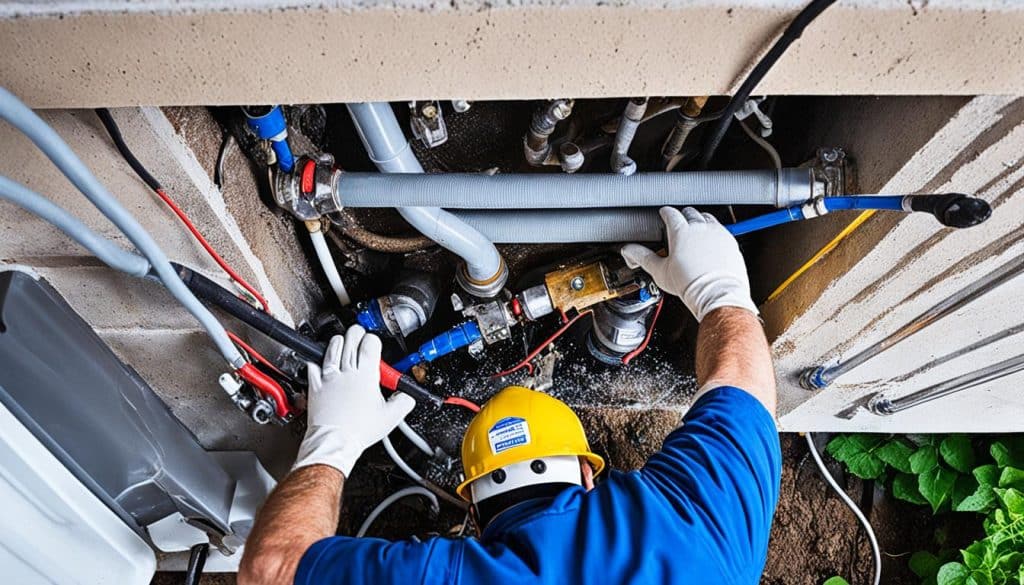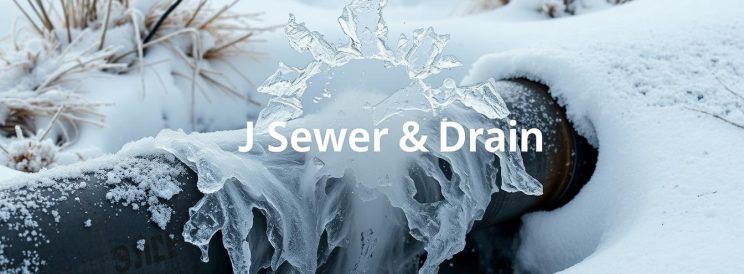Have you ever wondered What Causes Pipes to Burst, Especially During Winter? This question challenges common beliefs and invites us to explore the reasons. Knowing why pipes burst helps homeowners protect their homes from damage.
A burst pipe can make a big mess, especially when it’s cold. Cold weather puts your plumbing to the test. Winter plumbing tips and regular checks can prevent a small issue from becoming a big problem.
When water freezes in pipes, it expands and puts pressure on them. This pressure can cause pipes to burst, often in unexpected places like basements, attics, and garages.
Key Takeaways
- Understanding the main causes of pipe bursts can help prevent significant damage.
- Cold temperatures prompt water freezing in pipes, leading to increased internal pressure.
- Pipes in unheated areas are especially vulnerable during winter.
- Winter plumbing tips and regular maintenance are crucial for pipe protection.
- Knowing the age and material of your pipes can help predict their resilience.
Introduction to Burst Pipes in Winter
Burst pipes in winter can cause a lot of damage and are very expensive to fix. It’s important to know why they happen and clear up any wrong ideas. This way, we can take steps to prevent them.
Why It’s a Concern
Plumbing problems in cold weather can lead to burst pipes. This can damage homes and businesses a lot. Freezing temperatures and poor insulation can cause pipes to freeze and burst, leading to big water leaks and costly repairs.
It’s key to protect our pipes in winter to avoid these disasters.
Common Misconceptions
Many think ice expanding in pipes is the main reason for bursts. But, it’s really the pressure from ice blockages that causes pipes to burst. To keep our plumbing safe, we need good insulation and to act early.
J Sewer & Drain Plumbing Inc. says it’s better to prevent pipe bursts than to fix them after they happen. It’s cheaper and less stressful.
The Science Behind Frozen Pipes
Understanding frozen pipes is key to avoiding expensive fixes and keeping your home safe in winter. The science behind water freezing in pipes is based on physics.

How Water Freezes in Pipes
When it gets cold, water in pipes starts to freeze. As it turns to ice, it expands. This expansion increases the pressure inside the pipe.
This issue mainly affects areas near outside walls, unheated spaces, or where it gets very cold.
Pressure Buildup and Pipe Rupture
Ice in the pipe blocks the flow. The freezing process pushes water towards the faucet, raising pressure. When this pressure gets too high, the pipe bursts.
Many think only metal pipes can burst, but plastic ones like PVC and PEX can too. The burst usually happens away from the ice blockage, where water can escape.
Materials Affected by Freezing
While copper pipes are often seen as vulnerable, plastic pipes can also burst. Older plastic pipes, especially, become brittle and more likely to burst. Knowing both materials can freeze highlights the need for winterizing all plumbing.
Typical Causes of Pipe Bursts in Cold Weather
Homeowners need to know why pipes burst in cold weather. One big reason is how water in pipes changes size. This can weaken pipes, especially if they’re already not strong.
Spaces without heat and outside walls without insulation are most at risk. Pipes in these areas freeze and burst more easily. Keeping up with maintenance and adding weatherproofing can help stop pipe bursts.
Pipes with existing problems like loose connections or small cracks are more likely to burst. Freezing temperatures can make these weak spots worse. Fixing these issues quickly is key to keeping your pipes safe.
Regular checks and good insulation can lower the chance of plumbing problems in cold weather. These steps not only stop pipe bursts but also make your plumbing last longer and work better.
What causes pipes to burst, especially during winter?
Burst pipes in cold weather are often due to freezing temperatures. When it gets very cold, pipes shrink and become weak. Water inside the pipes freezing and expanding can then burst the pipes.

Impact of Cold Temperatures
The main reason for burst pipes is the sudden drop in temperature. In very cold winters, pipes are at risk of freezing and thawing. This cycle makes the pipes contract and stress them, leading to bursts.
Role of Pipe Material and Age
The type and age of the pipes also play a big role. Older pipes, especially copper ones, are more likely to burst. They can corrode and become brittle over time. J Sewer & Drain Plumbing Inc. suggests checking and replacing old pipes to avoid winter bursts.
High-Risk Areas for Frozen and Burst Pipes
Knowing where frozen and burst pipes are most likely to happen is key. It helps prevent expensive damage and keeps your home safe during winter. Homeowners need to take steps to protect these areas.
Unheated Spaces
Basements, attics, and garages are at high risk because they’re not heated. They often don’t have enough insulation. This makes them more likely to have frozen pipes. Insulating pipes well and keeping a steady temperature can help avoid pipe bursts.
Exposed Pipes
Pipes that are not covered, inside or outside, are a big worry. Pipes along exterior walls or in cold parts of the house freeze fast in winter. It’s important to cover these pipes with insulation or use heat tape to stop them from freezing and bursting.
Hoses and Exterior Connections
It’s crucial to protect outdoor plumbing, like garden hoses and faucets. Before winter, take hoses off and drain them. Make sure all outdoor connections are well-insulated. This stops water in hoses and faucets from freezing and causing pipe bursts.
Preventive Measures for Protecting Pipes in Winter
When it gets cold, it’s crucial to take steps to prevent burst pipes. One smart move is to use pipe insulation to protect your pipes from freezing.
Insulation Solutions
Adding insulation to your plumbing system can greatly reduce the risk of pipes freezing and bursting. Foam insulation is a cost-effective and effective way to keep your pipes warm. Also, insulating your water heater and its pipes, especially in unheated garages, adds extra protection during winter.
Heating Options for Vulnerable Pipes
Heating your pipes is another important step. Heat tape or cable can warm pipes that are prone to freezing. Keeping garage doors closed helps keep the heat in, protecting exposed pipes.
Regular Maintenance Tips
Regular maintenance is essential to avoid frozen pipes. A simple tip is to let faucets drip slightly when it’s very cold. This keeps water flowing. Also, remove harmful materials from under sinks to prevent freezing.
Check for any cracks or gaps where cold air might get in. Make sure your thermostat is set above 55 degrees Fahrenheit, even when you’re not home. For expert help, J Sewer & Drain Plumbing Inc. can guide you on these preventive steps.
How to Thaw Frozen Pipes Safely
Dealing with frozen pipes can be stressful, especially during winter. Knowing how to thaw frozen pipes safely is crucial. It helps prevent damage and keeps your plumbing system working well.
Using Heat Sources
When thawing frozen pipes, it’s important to use safe methods. One good way is to apply gentle heat. A hairdryer is a great tool because it provides controlled warmth.
Start at the coldest part of the pipe and move towards the warmer sections. Always keep the faucet open while thawing. This helps melt the ice and reduces the risk of a burst.
When to Call a Professional
If the pipe bursts or water starts leaking, call a professional. Companies like J Sewer & Drain Plumbing Inc. can help. They ensure the situation is handled safely and efficiently.
Their team can handle emergencies like flooding and electrical hazards in standing water. They are ready to help residents of Chicago and nearby areas. They offer strong guarantees and special promotions for their services.
Conclusion
Knowing why pipes burst in winter is key for homeowners. The cold weather and frozen water can damage plumbing systems. To avoid this, insulate pipes, heat vulnerable spots, and watch the temperature closely.
Areas like unheated spaces and exposed pipes need extra care. Using the right strategies can protect your home from winter’s harshness. Companies like J Sewer & Drain Plumbing Inc. offer expert advice to help.
Regular maintenance is crucial to prevent pipe bursts. With the right knowledge and tools, you can keep your plumbing safe. This way, you can enjoy a warm and safe home all winter long.


